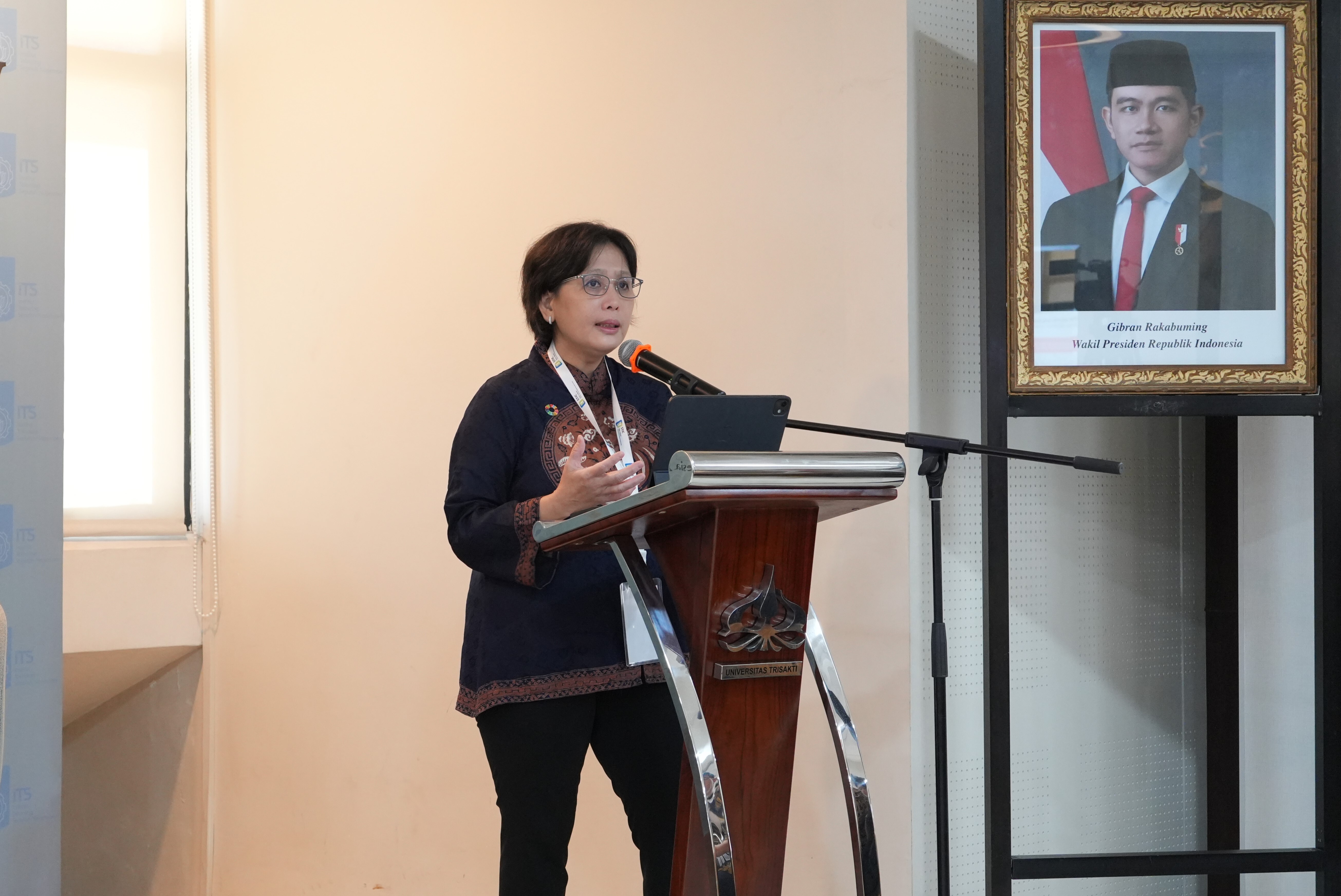Taiwan Tech Alumni showcase cutting-edge green tech at Taiwan-Indonesia Forum in Jakarta.[ 24 Apr. 2025]
To deepen Taiwan-Indonesia collaboration in the field of circular economy, the Taiwan-Indonesia Science and Technology Innovation Center, (STIC) at Taiwan Tech held the “2nd Taiwan-Indonesia Seminar on Circular Economy” from April 15-16 at Trisakti University in Jakarta. The event focused on two key issues: electronic waste management and plastic waste management. It attracted nearly 100 experts, leaders, and students from Taiwan and Indonesia, fostering in-depth discussions on innovative solutions and potential collaboration in the circular economy, while showcasing the high priority both sides place on these critical issues.

The 2025 Taiwan-Indonesia Seminar on Circular Economy was held from April 15-16 at Trisakti University in Jakarta, focusing on electronic waste management and plastic waste management. Over the course of two days, nearly 100 experts, industry leaders, and students from Taiwan and Indonesia participated in the event.
STIC specially invited several Taiwan Tech benchmark alumni-founded green businesses to share the latest technologies and practical experiences in the circular economy. These included Zheng-Zhi Liang, General Manager of TUL Group’s subsidiary, HanZhi IoT, and independent director Wen-Hsu Su, as well as Yong-Jun Zhang, International Business Director of UWin New Energy. They each discussed the latest advancements in lithium battery recycling and reuse. Notably, these two companies have jointly invested $60 million to establish a lithium battery recycling and reuse facility in the Wiraraja Industrial Zone in Batam, Indonesia, set to launch in August 2024. This marks a significant milestone for Taiwan’s green industry in Indonesia.

Zheng-Zhi Liang, General Manager of TUL Group’s subsidiary, HanZhi IoT, shared practical experiences in electronic waste management.

Assistant Professor Jenni Lie from the Department of Chemical Engineering at Widya Mandala Catholic University in Surabaya, Indonesia, shared her research on the process of recovering critical metals from electronic waste.
In addition to electronic waste, plastic waste recycling was also a key focus of the symposium. Zhu-Lan Cheng, Chairman of Li-Tsang Plastics Co., Ltd., and Yuan-Yu Huang, Manager at Chieh An Company Ltd., each introduced waste plastic recycling technologies, particularly in the areas of PET bottle sorting, cleaning, and food-grade recycling. They highlighted the application of automation and smart technologies, demonstrating Taiwan’s leading expertise in plastic resource recycling

The event also featured a special roundtable forum, where experts engaged in in-depth discussions on waste management and recycling issues, promoting knowledge sharing and collaboration opportunities. From left to right: Yuan-Yu Huang, Manager of Chief An Environmental Engineering Company Ltd. in Taiwan; Andi Manggala Putra, Research and Project Development Director of the Indonesian Plastic Recycling Association; and Zhu-Lan Cheng, Chairman of Li-Tsang Plastics Co., Ltd. in Taiwan.
Indonesian businesses also place great importance on circular economy issues. Lucia Karina, Director of the Sustainability Department at Coca-Cola Indonesia, shared the company’s integration of Sustainable Development Goals (SDGs) and Environmental, Social, and Governance (ESG) principles into its business strategies, enhancing environmental protection and social responsibility.

Lucia Karina, Director of the Sustainability Department at Coca-Cola Indonesia, shared how the company integrates Sustainable Development Goals (SDGs) and Environmental, Social, and Governance (ESG) principles into its business strategies.
Since the 1990s, Indonesia's economy has been growing rapidly, generating over 1.8 million tons of electronic waste and 3.2 million tons of plastic waste annually. Due to its widespread distribution across 17,000 islands, Indonesia is considered one of the countries most affected by plastic microbead ocean pollution. Trisakti University President Kadarsah Suryadi pointed out that Taiwan has extensive experience in its four-in-one recycling system, comprehensive waste management regulations, and technological innovation. He emphasized that the cooperation between Taiwan and Indonesia is highly complementary, with immense potential for future collaboration.

Kadarsah Suryadi, President of Trisakti University in Indonesia, delivered a speech.
Mr. Bruce Chen, Taiwan's Ambassador to Indonesia, stated that electronic and plastic waste have become global environmental challenges. In recent years, the Indonesian government has not only intensified efforts to close down over 300 illegal dumping sites but has also been actively promoting the construction of waste-to-energy facilities. He emphasized that Indonesia is eager to deepen cooperation with Taiwan, a country with mature technologies and practical experience, in tackling these environmental challenges together.

Mr. Bruce Chen, Taiwan’s Ambassador to Indonesia, delivered a speech.
Ms. Yu-Qing Jian, Section Chief, and Ms. Zhi-Yi Li, Group Leader, from Resource Circulation Administration, Ministry of Environment, delivered a special presentation on Taiwan’s circular economy policy development and management systems. They generously shared Taiwan’s 40 years of valuable experience in waste resource recycling, management system establishment, and digital transformation, demonstrating Taiwan’s expertise in promoting a circular economy and actively helping partner countries in their green transformation efforts.
The symposium was co-hosted by Taiwan Tech and Trisakti University, with strong support from Taiwan’s National Science Council (NSC), the Taipei Economic and Trade Office in Indonesia, Taiwan's Resource Circulation Administration, the Ministry of Environment, and Taiwan Tech alumni enterprises. Mr. He Lin, Technology Group Leader at the NSC’s Australian Representative Office, stated that the Taiwan-Indonesia Science and Technology Innovation Center is a cross-disciplinary cooperation platform linking academia, industry, and government agencies, dedicated to promoting practical technology transfer and innovative applications, bringing tangible benefits to both sides.

Mr. He Lin, Technology Group Leader at the National Science Council's Australian Representative Office, delivered a speech.
For the two-day conference, participants engaged in in-depth discussions and exchanges on topics such as recycling policies, digital transformation, ocean pollution prevention, and cross-border cooperation. They emphasized that circular economy should not remain just a slogan; only through cross-sector collaboration and the integration of technology can the circular concept be transformed into sustainable, actionable solutions. Moving forward, both sides will continue to deepen their cooperation in green energy, resource regeneration, and other fields, working together toward a more resilient and innovative green future.




